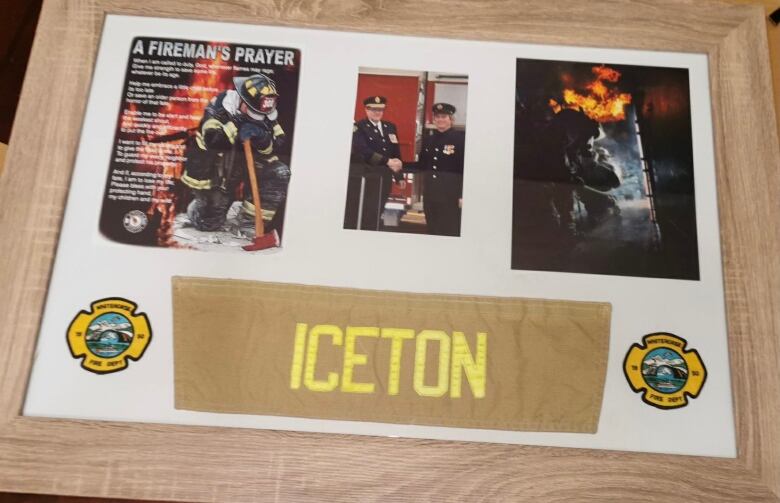Whitehorse volunteer firefighter retires after 47 years
"He would storm in and I think that speaks a lot to his drive and to his commitment to being a volunteer'
After 47 years of service, Whitehorse volunteer firefighter Mark Iceton has retired.
Over decades he's attended countless fires, mentored new firefighters and helped the department adapt to change.
He retired this week at age 66 without ever having been burned or seriously injured.
"I enjoyed it. I enjoyed the firefighting aspect of things. But, you know, there's the bad times too, when you have a fatality or something like that. But I enjoy firefighting and doing a service to the community," he said.
A <a href="https://twitter.com/hashtag/Whitehorse?src=hash&ref_src=twsrc%5Etfw">#Whitehorse</a> volunteer firefighter has retired after 47 years of service. <br><br>Mark Iceton was there in 1974 when the Casca and Whitehorse sternwheelers burned. <br><br>He was 19 and it was his first year as a volunteer firefighter.... <a href="https://t.co/wfde5SyAt5">pic.twitter.com/wfde5SyAt5</a>
—@YukonPhilippeSternwheelers fire of 1974
One memorable call was the destruction of two ships, the sternwheelers Casca and Whitehorse in 1974.
Iceton was 19 at the time and new to the firefighting volunteer service.
On that day, he helped spray buildings beside the riverboats, which included a round house where train mechanics worked in what is now Shipyards Park in Whitehorse.
The mechanics' shop was covered with tar paper siding and the fire "was so hot, it started melting the siding on the buildings," Iceton remembers.
After the main fire, he stayed behind to spray down spot fires which popped up from within the ships' wreckage.
Iceton also remembers seeing the Stephen Hotel engulfed in flames in 1977. That early-morning fire saw the hotel in Whitehorse completely destroyed and guests exit via windows and a rear fire escape with the help of firefighters and the RCMP.
Iceton said fires were more common in decades past.
"We used to have more fires than we do now. Like maybe three or four fires a month," he recalls.

Covered in paint, solvent and 'whatever else'
Wayne Smyth, a fire prevention officer with the City of Whitehorse, started volunteering with the fire department in 1976.
He remembers Iceton served as a teacher to new recruits even then, in his early 20s
"Pretty much all the skills were learned at the fire scene, and Mark was a real go-to person for new staff on the Whitehorse Fire Department," he said.
Once in the mid-1980s, both men crawled into a dark garage during a house fire in the Whitehorse neighbourhood of Crestview.
They were splashed with buckets of paint, solvent and "whatever else," was on a series of shelves which collapsed above them.
"We came out of there and we were covered. There were many times Mark and I were in the thick of it and Mark was not one to back down. He would storm in and I think that speaks a lot to his drive and to his commitment to being a volunteer," Smyth said.
Iceton recalls that day with a laugh,
"I remember my gear was all different colours," he said.
Changes in equipment, understanding of health risks
Firefighters' equipment has changed immensely since the 1970s, and Smyth said today there is far more understanding of health and safety.
"The gear is so much better nowadays. Back when we started, a breathing apparatus wasn't even on the truck. Many nights we would be in the thick of fires and not have any breathing protection," he said.
Firefighters also used to carry their own equipment to fires, storing gear in their personal vehicle or house.
Iceton says today it's understood that residue and "off gassing," is harmful and can lead to cancer or other illness.
Those kinds of risks have even informed a campaign where Yukon firefighters called for more coverage of cancer as an occupational hazard.
Iceton said he is retiring, in part, out of concern for others on the force, and due in part to an injury sustained by building a house.
"I feel pretty good. In my left knee I have some arthritis and it's starting to bother me now. I kind of wrecked my rotator cuff. So it was time to leave and keep the safety of other firefighters in mind with that. You know, you don't want to put somebody in danger trying to rescue yourself," he said.
Day job informed his volunteer job
Iceton's day job was with the City of Whitehorse's water services.
"This actually had some tangible benefits for us," said Jason Everitt, the city's fire chief. "We rely on the hydrant and water system and Mark was our resident in-house expert on this."
Firefighters marked the occasion of his retirement in a small ceremony Dec. 8.
Iceton's family, including wife Elaine and daughter Serena, were also thanked.
"It's not a sacrifice just on behalf of the firefighter, but the family as well," Everitt said.
For his retirement, Iceton was presented with a piece of his firefighting jacket called a turnout coat. The name patch has been cut out and put into a frame, alongside a copy of the famous poem, the Fireman's Prayer.
